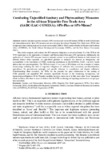Combating Unjustified Sanitary and Phytosanitary Measures in the African Tripartite Free Trade Area (SADC-EAC-COMESA): SPS-Plus or SPS-Minus?
Abstract
Sanitary and phytosanitary measures (SPS) are incessant non-tariff barriers (NTBs) to trade in both intra
and extra-African trade. New SPS measures are now set up in the African Tripartite Free Trade Area (TFTA) that
amalgamate three existing regional economic communities (RECs): The Common Market for Eastern and Southern
Africa (COMESA), the South African Development Community (SADC), and the East African Community
(EAC).
This article compares and contrasts the SPS measures obligations as set out in Annex 15 of the TFTA to the
WTO Agreement on the Application of Sanitary and Phytosanitary Measures (SPS Agreement). Additionally, the
application of ‘abusive SPS measures based on minority science’ as non-tariff trade barriers to both internal and
external African trade especially on agricultural products is analysed. An increase in transparency and
accountability in the formulation of NTBs monitoring mechanisms in the COMESA, SADC, and EAC would
address this ever present problem. The TFTA in Annex 15 is a case of SPS-Minus as it has a number of serious
shortcomings including the lack of important obligations of sufficient risk assessment, non-discrimination,
equivalence, the precautionary principle, and specific reference to consultations and dispute settlement.
Notwithstanding these omissions, the TFTA has the potential for great achievement in the curbing of
NTBs generally and unjustified SPS measures specifically because of the monitoring, transparency, and
harmonisation obligations. If the Tripartite mandate, however, turns out to be like most other ‘loose’ integration
efforts in Africa, then there is reason to believe that the NTB monitoring and reporting mechanism is not going to
bear much fruit.

